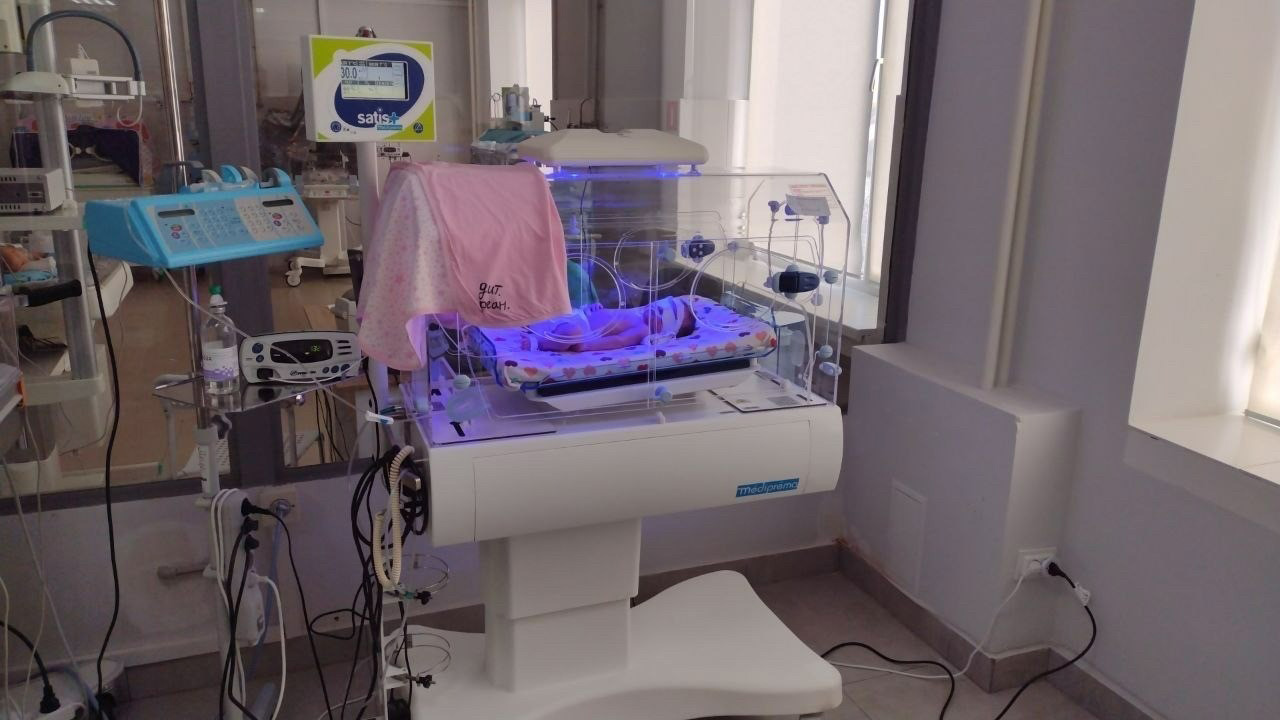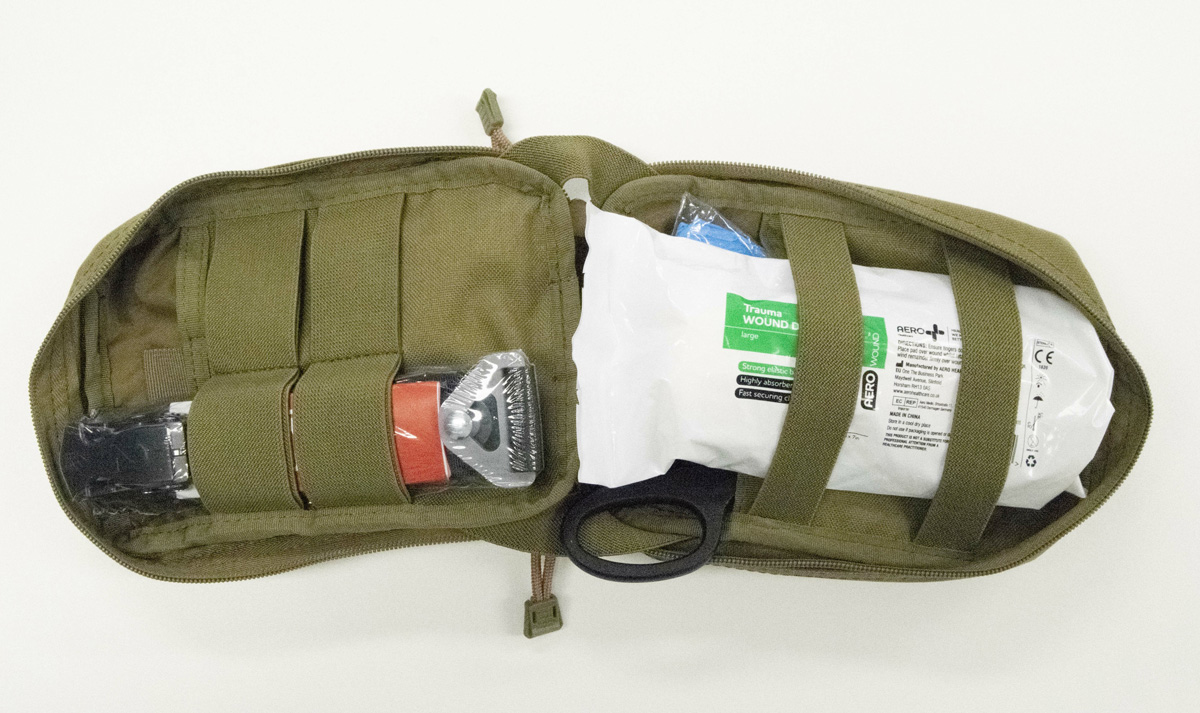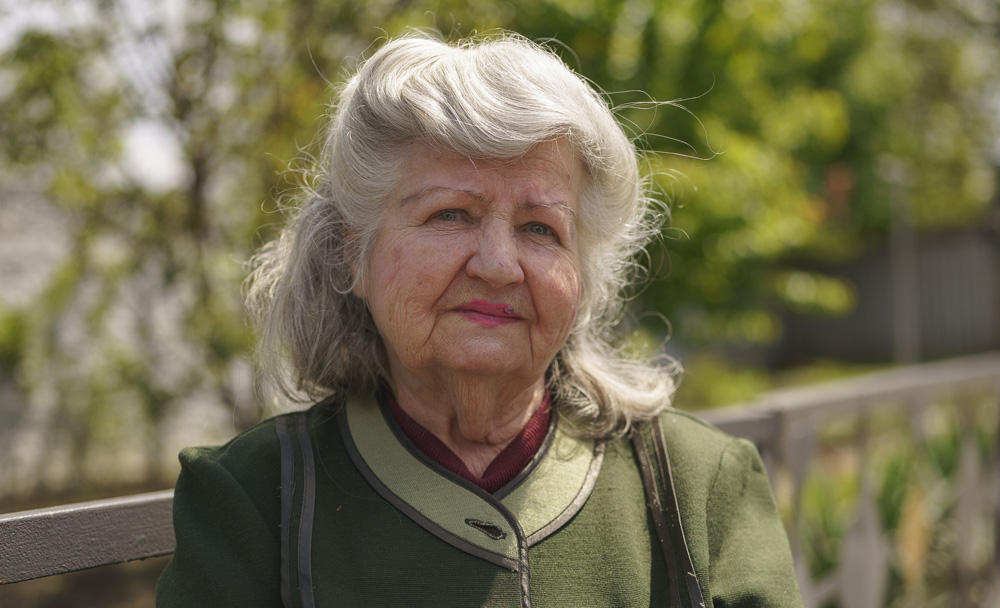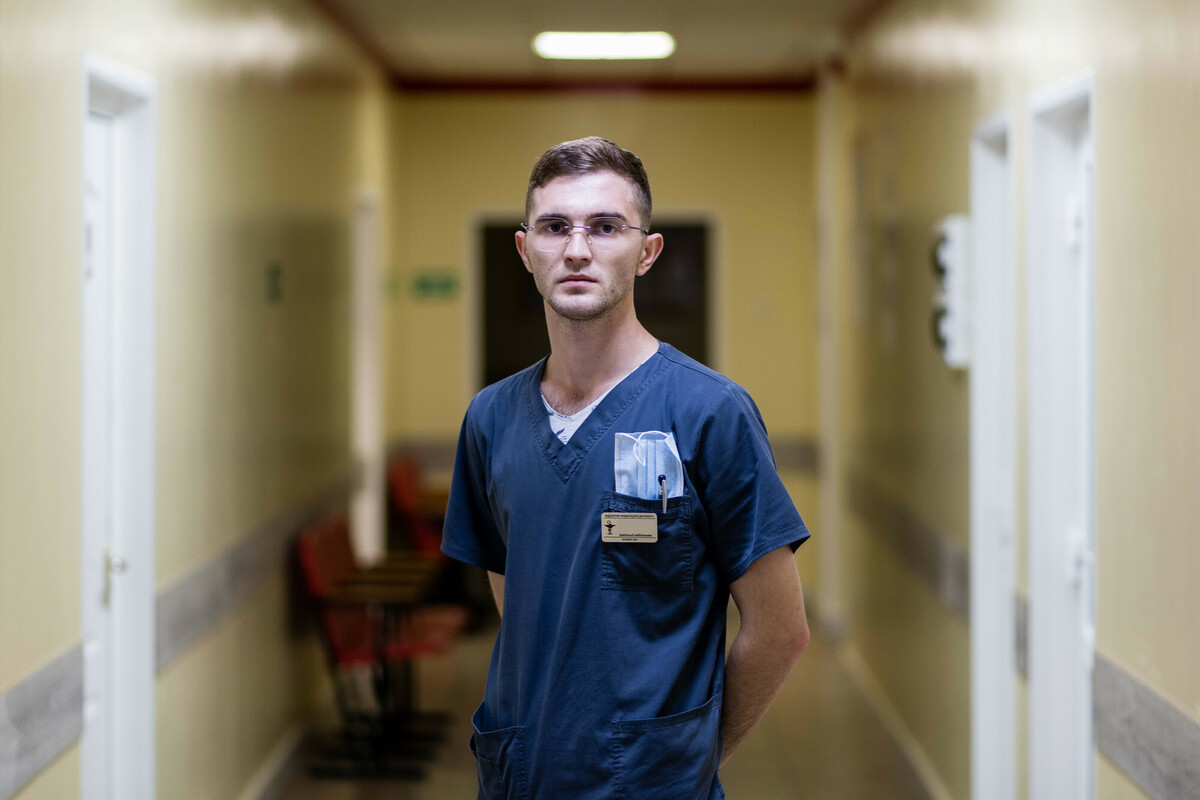In the neo-natal intensive care unit of a district hospital in western Ukraine, machines hiss and beep, displaying heart beats and oxygen levels on screens. Inside Perspex boxes, tiny premature babies lie, their chests rising and falling with the effort of breathing weeks earlier than anticipated.
“Most of these children need special equipment to support life,” said a doctor who can’t be named for security reasons. “Incubators are one of the key elements of the equipment. This equipment ensures the microclimate necessary for a baby to survive.”
The four high-tech incubators supplied by Christian Aid via Crown Agents are just one example of the many lifesaving ways that funds from the Ukraine Humanitarian Appeal have been providing medical assistance for people caught up in the conflict.
In total 34 incubators have been delivered throughout the country with DEC funds. Tania Korotchenko, who runs the Crown Agents Ukraine office in Kyiv, says: “The doctors said ‘we are really saving lives with this. You know, a little piece of plastic and metal is really changing the story.’”

Even the very youngest are suffering the effects of the conflict. In the first four months of 2021, this hospital cared for 26 premature babies. In the same period in 2022, 37 babies were born prematurely and a total of 74 required hospital treatment.
As in other conflicts, doctors say stress, ill health and physical strain have led to a rise in the number of premature births in Ukraine over the last year, and increased complications for newborns. On top of which, many hospitals like this have seen patient numbers spike as people flee areas further east where many health facilities have been damaged or destroyed, notably including the Mariupol maternity hospital.
The conflict has of course directly impacted health needs of the wider population: with large numbers needing treatment for injuries sustained as fighting, shelling and bombing has hit civilian centres. January 2023 figures from the Office of the United Nations High Commissioner for Human Rights (OHCHR) puts the number of civilians killed in the conflict at at least 6,919, with a further 11,075 injured, although OHCHR warns that these are likely considerable underestimates.
Save the Children and Christian Aid both used DEC funds to provide trauma kits for civilian use to the Ukrainian Ministry of Health via Crown Agents. These kits contain equipment - scissors, gloves, specialist gauze and a tourniquet - to treat major injuries or control bleeding until professional medical attention can be sought. With frequent strikes on civilian targets causing large numbers of casualties during the conflict, having such equipment available became crucial to save lives. Between them, the two charities supplied over 75,000 kits in the first six months of the response using DEC funds.

Tania Korotchenko from Crown Agents says that according to the Ukrainian government, there has been a 25% reduction in deaths as a result of injuries because most Ukrainian citizens have now been trained in their use. “In the majority of cases, the death is caused by the loss of a huge amount of blood. So basically, with this very simple set of products, you can save a life,” she says.
DEC charities and their partners and affiliates have worked to support hospitals and clinics struggling to deal with the increased demand for treatment. The International Committee of the Red Cross (ICRC), for instance, which received DEC funding through the British Red Cross, supported more than 170 healthcare facilities across Ukraine, many of which had lost basics such as electricity, with generators and other equipment crucial for them to function. Achille Balthazar Despres, a spokesperson for ICRC, says: “Our teams on the ground have also seen hospitals that don't have other necessary equipment to carry out their work. We have worked to provide not just generators, but all the equipment to help these hospitals become fully functional, including medical equipment, casualty kits, drugs and medicine. Our goal is to make sure that the hospitals are able to function and carry out their life-saving activities.”
Ukraine's health system was already contending with years of under-investment and the aftermath of the Covid-19 pandemic. The increased demands of the conflict, coupled with the fact that many hospitals and clinics have been damaged and destroyed have left it struggling to cope.
In extreme cases, with no care available, some patients had to be medically evacuated, either from east to west Ukraine or out of the country altogether.
Where services were able to continue, the conflict directly affected care, with treatment of casualties impacting health workers’ capacity to deliver routine, everyday care, and treatment for acute conditions such as cancer and chronic conditions. Threats of attack and air raids forced those being treated as in-patients to stop treatment and seek shelter underground.
In one hospital in Vinnytsia, DEC charity World Vision in collaboration with Medair used appeal funds to retrofit the entire basement to create four new safe, underground treatment spaces to avoid such interruptions in care. Catherine Green, Ukraine Response Country Director at World Vision, says: “If there was an air alarm, or threat of attack, [healthcare workers] could simply take patients downstairs and continue the treatment.”

The conflict also resulted in critical gaps in healthcare. The World Health Organization (WHO) found that since the escalation of hostilities, medicines and health services were the most commonly reported needs after financial assistance. Many people – particularly the older people – were unable to procure medication to continue long-term treatment. With drugs for diabetes, blood pressure and even simple painkillers in short supply, the lack of medicines in healthcare centres or pharmacies was the most commonly reported barrier to accessing healthcare.
Although many healthcare professionals did stay to work despite the often incredibly challenging conditions, both conscription and the large numbers fleeing the conflict also reduced the overall numbers able to deliver care.
DEC funds were used to provide quality healthcare services to a total of 70,800 people in Ukraine in the first six months of the response. This included supporting primary healthcare centres and health posts in transition centres in Zaporizhzhia, south-eastern Ukraine, and setting up and equipping mobile health units in areas such as Mykolaiv, southern Ukraine, to provide care for people who were unable to access other facilities.
DEC charity Action Against Hunger set up and equipped a medical centre in its partner’s premises in Lviv region, to provide free health consultations and support medical evacuations. The charity is also supporting mobile health units and primary care.
DEC charities, working closely with the Ukraine Ministry of Health, supplied medicines and medical equipment to a total of 1,431 hospitals, clinics and health centres inside Ukraine, providing everything from antibiotics and anti-inflammatory drugs to medical beds, phototherapy units and equipment for ambulances such as defibrillators. Member charities also distributed over-the-counter medications such as painkillers, creams and decongestants to individuals. In some areas, people were given prepaid gift cards to use at local pharmacists.
Willow Rook, Deputy Country Director at Action Against Hunger, one of the DEC charities that is helping supply equipment and pharmaceutical supplies in Ukraine, says: “There's a lot of need in terms of non-communicable diseases. Things like blood pressure medication, and diabetes medication is quite essential.”
ICRC’s work has enabled more than 130,000 people in Ukraine to continue their treatment for various non communicable diseases (although this part of their work wasn’t funded by the DEC).“We’ve seen hospitals that, because of lack of medicines, were not able to continue lifesaving treatments for patients,” says Achille Balthazar Despres, spokesperson for the ICRC. “This is where the interventions of our teams have made such a big difference in the lives of people.”
HelpAge International, partner of DEC charity Age International, gave cash grants to 39 local organisations in Ukraine in part to work with health professionals to buy medicines for older people. The grants were designed to be as flexible as possible to suit changing circumstances.
Cash assistance has been used to pay not just for medicines but also for surgery costs. Mariya Tuzyk, project co-ordinator for POSMISHKA UA, a partner of Concern Worldwide, in Ukraine, recalls: “We recently had a young boy who had an operation, and the hospital bills were too high for that family. So this cash assistance really helped them out – that’s what we heard from this family. Cash assistance [means that] the beneficiary is able to really decide for themselves and for their family what the priority is at that exact moment.”

Valentina, 81, from Severodonetsk in Luhansk region, was being treated in hospital for a lung infection when the conflict started. She fled to Dnipro after a bomb broke the windows in her house and is now living in temporary accommodation. HelpAge volunteers brought her medication for her lungs as well as food and hygiene products, all provided with DEC funds. “I did not have a chance to recover until we came here,” she said in May 2022.
To strengthen the health system’s workforce to deal with the new challenges brought on by the conflict, DEC charities have been providing training to clinical staff, working closely with national and regional health authorities. This has included training in orthopaedic nursing, surgery and cardio-pulmonary resuscitation, and managing mass casualties and trauma. Courses have also been run on chemical, biological, radiological and nuclear response. First responders such as the fire and rescue service, police officers and paramedics have also been trained.
DEC funds have also been used to hire psychologists and specialist mental health workers to provide counselling to a civilian population whose mental health needs have rocketed after enduring months of conflict and the stress of displacement. For more info see Dealing with Trauma.
Appeal funds have also been used to make the sorts of fundamental interventions that underpin hospital and healthcare services, such as providing clean water. One project run by Oxfam with DEC funds in the Odesa region repaired and expanded the capacity of a local water system, providing clean water to 73,00 0 people, as well as the local hospital.
“As a resuscitator, it’s impossible to overstate the importance of the clean water supply,” said Dmytro, an anaesthetist also acting as Head of the Emergency Department at the hospital. “Any condition that we’re treating is critical and any critical condition disrupts the exchange of water and electrolytes [in the body]. Clean water also helps the hospital to maintain operational work such as sterilisation and providing toilets for the patients – lots of things from the moment of hospitalisation to when the patient is discharged.”

Oxfam also worked to prevent any additional burdens being placed on Ukrainian health services, especially by repairing sewage systems damaged in the conflict to prevent the transmission of waterborne diseases, and installing sewer pumps and providing chemicals to treat waste water. DEC funds were also used to run information campaigns on the importance of good hygiene in stopping the spread of disease.
As the conflict heads into its second year, the pressures on Ukraine’s healthcare system are set to persist. Civilians continue to be injured, while health facilities struggle with blackouts and a lack of heating and water caused by attacks on Ukraine’s power grid and other critical infrastructure. Some surgeons have reportedly been working by torchlight.
Conditions are so difficult that the Ministry of Health has instructed hospitals to only provide emergency care, and suspend planned surgery temporarily to ease the load on the medical system.
Meanwhile the WHO has warned that the lack of heating in homes caused by the blackouts could cause more health difficulties, including spreading infections like Covid-19, pneumonia and flu in a country that can plummet to –20°C over winter. For more information on how DEC charities are supporting people over the winter see A Cold, Dark Winter.